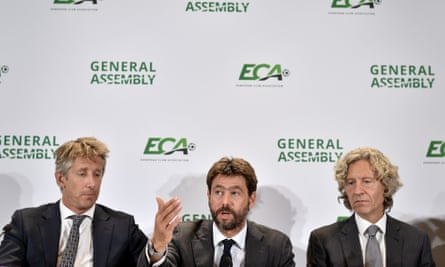Agreement on a new “ideal” Champions League is imminent, according to the man who represents Europe’s biggest clubs, which may put pressure on the Premier League to reduce its fixture list in future if it is to benefit.
Andrea Agnelli, the chairman of the European Clubs Association, said on Monday he expects a reshaped Champions League to be agreed within weeks. The Juventus president wants an expanded competition to be just the start of wide-ranging reforms at the top of the game that could mean the overall number of domestic games in England is reduced and a ban on transfers between elite sides.
Uefa is expected to ratify plans for an expanded Champions League of 36 teams, with each club playing 10 group matches in a “Swiss system” that would see them ranked in a single league table. This would bring an end to recurring rumours of a breakaway Super League, something Agnelli says he has always been keen to avoid.
“I think we’re very close to my ideal Champions League, I think the Swiss system is beautiful,” he said. “I think it will provide great opportunities for those teams participating in that competition. It will provide the knockouts that are the essence of any competition. It’s very, very close to an ideal Champions League. We’re maybe just a couple of weeks away.
“My attention for quite a long time has been to make sure we find a solution with Uefa. We had fights with Alex [Uefa’s president, Alexander Ceferin] in the autumn months because we wanted to find the balance between continental and domestic competition. It’s [about] having a balanced competitive landscape.”
Quick GuideHow Uefa's new 'Swiss system' Champions League works
Show
New UEFA 'Swiss system' for the Champions League
From the 2024/25 season, the UEFA Champions League will be expanded to 36 teams. Replacing the group stage is one 'Swiss system' league table, and each team is guaranteed to play ten matches, five home and five away. Fixtures will be determined by seedings.
The top eight sides in the league table after the ten matches will qualify for the knockout stage. Teams finishing in ninth to 24th place will compete in a two-legged play-off to secure their place in the last 16 of the competition.
From the Round of 16 onwards, the traditional two-legged home and away knockout ties take place, culminating in a one-off final at a neutral venue.
Similar format changes will also be applied to the UEFA Europa League and the new UEFA Europa Conference League competition, which may also be expanded.
'European Super League' proposal
On 18 April 2021, twelve clubs had announced that they intended to be the founding members of a new "European Super League". The clubs were: AC Milan, Arsenal, Atlético de Madrid, Chelsea, Barcelona, Inter Milan, Juventus, Liverpool, Manchester City, Manchester United, Real Madrid and Tottenham Hotspur
Their proposal document stated that there would be "clubs participating in two groups of 10, playing home and away fixtures, with the top three in each group automatically qualifying for the quarter-finals. Teams finishing fourth and fifth will then compete in a two-legged play-off for the remaining quarter-final positions. A two-leg knockout format will be used to reach the final at the end of May, which will be staged as a single fixture at a neutral venue."
The project collapsed in the face of overwhelming opposition from fans, clubs not invited, and the footballing authorities. The six founding English clubs announced they would withdraw..
Agnelli, whose organisation represents 246 clubs across Europe including nine in the Premier League, says he wants the domestic calendar to take up only two thirds of any season. The Premier League have pushed back against the new Champions League proposals due to their effects on the calendar but Agnelli believes it is the larger domestic competitions, such as the English top flight, that will eventually have to compromise.
“If we look back in time the Champions League had four more games than it has today,” Agnelli said. “I think the balance that we are trying to strike is one third international [European competition] and two thirds domestic. We can take a look at the overall calendar, we have countries like England with a maximum number of games at 53, If I’m not mistaken, Germany is 43 and so is Italy.

“We do think that currently for competitive balance purposes 20 teams in leagues are too many. There is an overall element that could actually be worked out altogether in the interests of everyone.”
With the new competition not set to start until 2024, Agnelli would like any restructuring to be made in tandem with wider reform. He wants an end to financial fair play in its current form, with clubs scrutinised on their overall balance sheet rather than annual profit and loss. He also said the ECA had discussed changing the transfer system so Champions League clubs could no longer buy from or sell to each other, instead trading only with lower-ranking clubs.
“No triple-figures transfers between Champions League participating clubs maybe would [mean] focusing instead on champion players in smaller countries allowing us only to buy players there,” Agnelli said. “These are elements we are discussing but certainly cost control will be one of the biggest challenges in terms of reforms going forward.”
Agnelli also stressed that football must think of ways to attract younger viewers in an increasingly crowded marketplace. “We could imagine a subscription for the last 15 minutes of a specific game,” he said. “The attention span of today’s kids and tomorrow’s spenders is completely different to the one I had when I was their age.
“If you take golf, if it’s interesting at all, it’s only the last six holes on the final day. You are not going to watch the whole thing on the TV unless you are a hardcore fan.”
